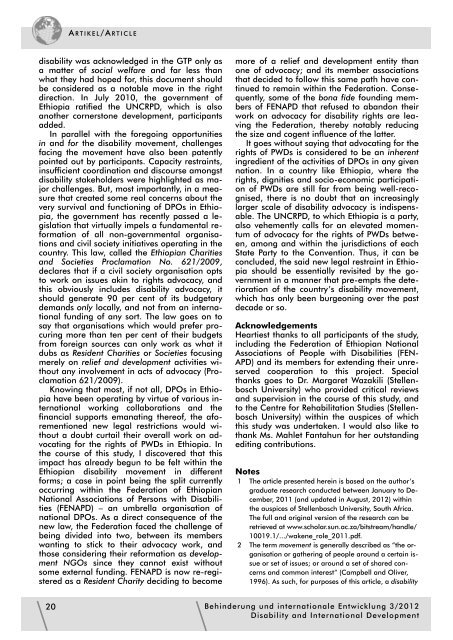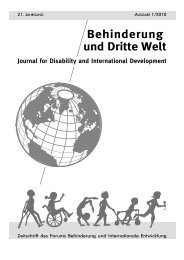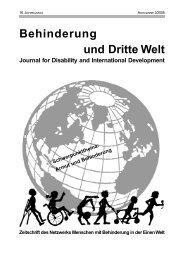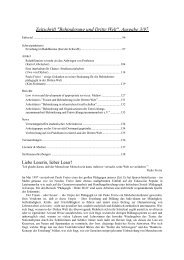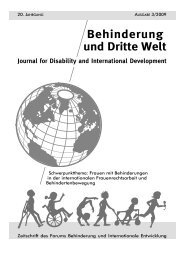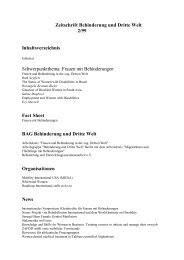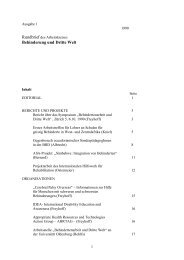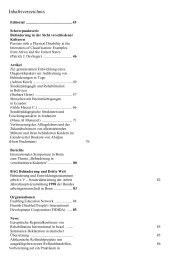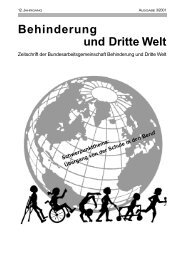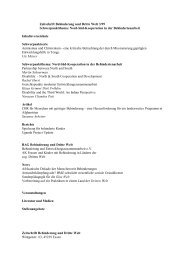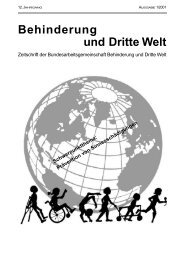Behinderung und internationale Entwicklung Disability and ...
Behinderung und internationale Entwicklung Disability and ...
Behinderung und internationale Entwicklung Disability and ...
You also want an ePaper? Increase the reach of your titles
YUMPU automatically turns print PDFs into web optimized ePapers that Google loves.
A RTIKEL/ARTICLEdisability was acknowledged in the GTP only asa matter of social welfare <strong>and</strong> far less thanwhat they had hoped for, this document shouldbe considered as a notable move in the rightdirection. In July 2010, the government ofEthiopia ratified the UNCRPD, which is alsoanother cornerstone development, participantsadded.In parallel with the foregoing opportunitiesin <strong>and</strong> for the disability movement, challengesfacing the movement have also been patentlypointed out by participants. Capacity restraints,insufficient coordination <strong>and</strong> discourse amongstdisability stakeholders were highlighted as majorchallenges. But, most importantly, in a measurethat created some real concerns about thevery survival <strong>and</strong> functioning of DPOs in Ethiopia,the government has recently passed a legislationthat virtually impels a f<strong>und</strong>amental reformationof all non-governmental organisations<strong>and</strong> civil society initiatives operating in thecountry. This law, called the Ethiopian Charities<strong>and</strong> Societies Proclamation No. 621/2009,declares that if a civil society organisation optsto work on issues akin to rights advocacy, <strong>and</strong>this obviously includes disability advocacy, itshould generate 90 per cent of its budgetarydem<strong>and</strong>s only locally, <strong>and</strong> not from an internationalf<strong>und</strong>ing of any sort. The law goes on tosay that organisations which would prefer procuringmore than ten per cent of their budgetsfrom foreign sources can only work as what itdubs as Resident Charities or Societies focusingmerely on relief <strong>and</strong> development activities withoutany involvement in acts of advocacy (Proclamation621/2009).Knowing that most, if not all, DPOs in Ethiopiahave been operating by virtue of various internationalworking collaborations <strong>and</strong> thefinancial supports emanating thereof, the aforementionednew legal restrictions would withouta doubt curtail their overall work on advocatingfor the rights of PWDs in Ethiopia. Inthe course of this study, I discovered that thisimpact has already begun to be felt within theEthiopian disability movement in differentforms; a case in point being the split currentlyoccurring within the Federation of EthiopianNational Associations of Persons with Disabilities(FENAPD) – an umbrella organisation ofnational DPOs. As a direct consequence of thenew law, the Federation faced the challenge ofbeing divided into two, between its memberswanting to stick to their advocacy work, <strong>and</strong>those considering their reformation as developmentNGOs since they cannot exist withoutsome external f<strong>und</strong>ing. FENAPD is now re-registeredas a Resident Charity deciding to becomemore of a relief <strong>and</strong> development entity thanone of advocacy; <strong>and</strong> its member associationsthat decided to follow this same path have continuedto remain within the Federation. Consequently,some of the bona fide fo<strong>und</strong>ing membersof FENAPD that refused to ab<strong>and</strong>on theirwork on advocacy for disability rights are leavingthe Federation, thereby notably reducingthe size <strong>and</strong> cogent influence of the latter.It goes without saying that advocating for therights of PWDs is considered to be an inherentingredient of the activities of DPOs in any givennation. In a country like Ethiopia, where therights, dignities <strong>and</strong> socio-economic participationof PWDs are still far from being well-recognised,there is no doubt that an increasinglylarger scale of disability advocacy is indispensable.The UNCRPD, to which Ethiopia is a party,also vehemently calls for an elevated momentumof advocacy for the rights of PWDs between,among <strong>and</strong> within the jurisdictions of eachState Party to the Convention. Thus, it can beconcluded, the said new legal restraint in Ethiopiashould be essentially revisited by the governmentin a manner that pre-empts the deteriorationof the country’s disability movement,which has only been burgeoning over the pastdecade or so.AcknowledgementsHeartiest thanks to all participants of the study,including the Federation of Ethiopian NationalAssociations of People with Disabilities (FENAPD) <strong>and</strong> its members for extending their unreservedcooperation to this project. Specialthanks goes to Dr. Margaret Wazakili (StellenboschUniversity) who provided critical reviews<strong>and</strong> supervision in the course of this study, <strong>and</strong>to the Centre for Rehabilitation Studies (StellenboschUniversity) within the auspices of whichthis study was <strong>und</strong>ertaken. I would also like tothank Ms. Mahlet Fantahun for her outst<strong>and</strong>ingediting contributions.Notes1 The article presented herein is based on the author’sgraduate research conducted between January to December,2011 (<strong>and</strong> updated in August, 2012) withinthe auspices of Stellenbosch University, South Africa.The full <strong>and</strong> original version of the research can beretrieved at www.scholar.sun.ac.za/bitstream/h<strong>and</strong>le/10019.1/.../wakene_role_2011.pdf.2 The term movement is generally described as “the organisationor gathering of people aro<strong>und</strong> a certain issueor set of issues; or aro<strong>und</strong> a set of shared concerns<strong>and</strong> common interest” (Campbell <strong>and</strong> Oliver,1996). As such, for purposes of this article, a disability20<strong>Behinderung</strong> <strong>und</strong> <strong>internationale</strong> <strong>Entwicklung</strong> 3/2012<strong>Disability</strong> <strong>and</strong> International Development


